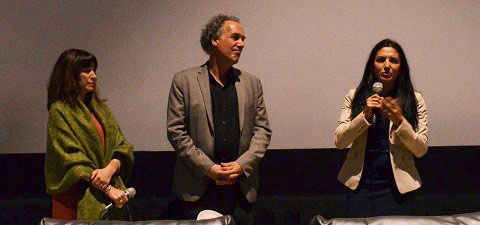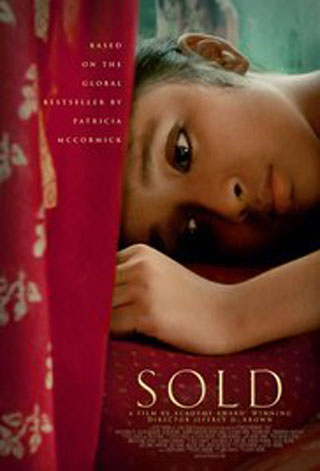SOLD is a wrenching film about the evil of child sex trafficking, a phenomenon that is horrendously widespread around the world but very under-reported. It opens in the lush mountain scenery of Nepal, where 13 year-old Lakshmi lives a happy but simple life flying kites and helping her parents on their tiny hillside farm. But when heavy rains destroy their rice crop, the father takes money from a woman who promises to get Lakshmi a job housecleaning for a rich family in neighboring India. Instead, the young girl is sold into sexual slavery in the sleazy underworld of Kolkata. She is confined to a low class brothel where she is drugged, raped and then forced to service up to 10 clients a night by the brothel-owner who claims Lakshmi has to work to pay off her "debt". She is constantly threatened by drunken clients, violent brothel-keepers and the invisible threat of HIV. It is as if she has descended to Dante's first circle of Hell.
Some 5.5 million children live in slavery, and 1.8 million are trafficked every year, according to Jeffery Brown, the film's director. "By telling one girl's story we hope to wake the world up. This is happening on a massive scale... This is a light version of what is actually going on," said Brown of the film that is based on the novel by Patricia McCormick. "Human trafficking is a $150 billion dollar industry," said producer Jane Charles. "It's in every country in the world and every city in the world." She said their aim is to create a movement for change.
The film took nine years to make, and involved extensive and grueling research. "Every actor in the cast spent hours talking to survivors and sex workers," said Brown. They met about two-thousand children who had been trafficked in Nepal and India." A lot of the kids had kids - 15-year-olds who had 1-year-olds," said Brown. 60-70% of them also had HIV or AIDS. "They weren't rescued, but discarded because of their disease," said Brown. "It's a really intense issue."
Niyar Saikia, who played Lakshimi, celebrated her 13th birthday on set and was in nearly every scene. The crew shot in Kolkata for a month and a half, shooting 12 hours a day - most of the actors came from Mumbai. The actors and film-makers had a difficult time with the material. "We actually all got really sick making this film. We all got really sad - we all cried a tremendous amount," said Brown. "We all had to process and help each other process what we were recreating... In the end we knew we were giving a voice to those who have no voice."
Brown says some 30% of child prostitutes do end up escaping, either on their own or with the help of an empathetic client. But their suffering is not over - many will not be accepted back into their families because of the shame involved. Attending the screening was a survivor of trafficking, Norma, from Mexico. Although she was not connected with the film, the filmmakers called for her to come down to the front of the room, where she offered her own reaction to the film in a very moving manner. "Wow," said Norma, who was seeing SOLD for the first time. "It really is a lot like that." She said she was first trafficked in Japan when she was 10-years-old and talked about her desperation - having no passport and being raped in a car with power locked doors. "I've been trafficked and kidnapped," she said. Every time Norma escaped, she ended up being trafficked again. "We need opportunities," she said. "My journey didn't have to be that long."

Q&A with producer Jane Charles, director Jeffrey Brown, and trafficking survivor Norma
Creating opportunities for those who have been trafficked, and helping to prevent it from happening, is the bigger goal of the filmmakers, who have already been receiving extensive press coverage. Since showing the film, their efforts have resulted in 20 schools being built in Nepal. Their plan is to build 200 more schools by spring next year. A shorter 50 minute PG-13 version of SOLD is playing in high schools to help spread the word. "The good news is there are lots of people doing remarkable work," said Brown. "If you can bring one of these kids back to life fully and empower them and give them skills as a leader," said Brown, "these are the ones that can lead the change."

